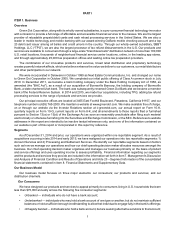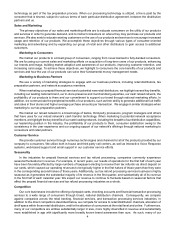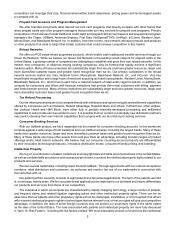Green Dot 2015 Annual Report Download - page 13
Download and view the complete annual report
Please find page 13 of the 2015 Green Dot annual report below. You can navigate through the pages in the report by either clicking on the pages listed below, or by using the keyword search tool below to find specific information within the annual report.7
compliance program. We offer our services largely through our retail distributor and network acceptance member
relationships. We have developed an anti-money laundering training manual and a program to assist in educating our
retail distributors on applicable anti-money laundering laws and regulations.
Money Transmitter Licensing Regulations
We are subject to money transmitter licensing regulations. We have obtained licenses to operate as a money
transmitter in 40 states, Puerto Rico and Washington, D.C. and have applied for licensure in one additional state after
a change in their statute. The remaining U.S. jurisdictions either do not currently regulate money transmitters or have
rendered a regulatory determination or a legal interpretation that the money services laws of that jurisdiction do not
require us to obtain a license in connection with the conduct of our business. As a licensee, we are subject to certain
restrictions and requirements, including reporting, net worth and surety bonding requirements and requirements for
regulatory approval of controlling stockholders, agent locations and consumer forms and disclosures. Many states
require that we must at all times maintain cash and highly rated investment securities in an amount equivalent to all
outstanding settlement obligations. We are also subject to inspection by the regulators in the jurisdictions in which we
are licensed, many of which conduct regular examinations.
Escheatment Laws
Unclaimed property laws of every U.S. jurisdiction require that we track certain information on our card products
and services and that, if customer funds are unclaimed at the end of an applicable statutory abandonment period, the
proceeds of the unclaimed property be remitted to the appropriate jurisdiction. We manage escheatment law compliance
with respect to our card products and services and have an ongoing program to comply with those laws. Statutory
abandonment periods applicable to our card products and services typically range from three to seven years.
Privacy and Information Safeguard Laws
In the ordinary course of our business, we collect certain types of data, which subjects us to certain privacy and
information security laws in the United States, including, for example, the Gramm-Leach-Bliley Act of 1999, or the GLB
Act, and other laws or rules designed to regulate consumer information and mitigate identity theft. We are also subject
to privacy laws of various states. These state and federal laws impose obligations with respect to the collection,
processing, storage, disposal, use and disclosure of personal information, and require that financial institutions have
in place policies regarding information privacy and security. In addition, under federal and certain state financial privacy
laws, we must provide notice to consumers of our policies and practices for sharing nonpublic information with third
parties, provide advance notice of any changes to our policies and, with limited exceptions, give consumers the right
to prevent use of their nonpublic personal information and disclosure of it to unaffiliated third parties. Certain state laws
may, in some circumstances, require us to notify affected individuals of security breaches of computer databases that
contain their personal information. These laws may also require us to notify state law enforcement, regulators or
consumer reporting agencies in the event of a data breach, as well as businesses and governmental agencies that
own data. In order to comply with the privacy and information safeguard laws, we have confidentiality/information
security standards and procedures in place for our business activities and with network acceptance members and our
third-party vendors and service providers. Privacy and information security laws evolve regularly, requiring us to adjust
our compliance program on an ongoing basis and presenting compliance challenges.
Banking Regulations
We became a bank holding company in December 2011, as a result of our acquisition of Bonneville Bancorp, the
holding company of Bonneville Bank, a state-chartered Utah bank, which was renamed Green Dot Bank after the
acquisition. We and our subsidiary bank are extensively regulated under federal and state laws, which, in general,
results in increased compliance costs and other expenses, as we and our subsidiary bank are required to undergo
regular on-site examinations and to comply with additional reporting requirements. As a bank holding company, we
are subject to the supervision of, and inspection by, the Federal Reserve Board and the State of Utah Department of
Financial Institutions and are subject to certain regulations which, among other things, restrict our business and the
activities in which we may engage. Our existing business activities and currently proposed business activities are not
materially restricted by these regulations.
Activities. Federal laws restrict the types of activities in which bank holding companies may engage, and subject
them to a range of supervisory requirements, including regulatory enforcement actions for violations of laws and policies.
Bank holding companies may engage in the business of banking and managing and controlling banks, as well as
closely related activities. In addition, financial holding companies may engage in a wider set of activities, including with
respect to securities activities and investments in companies engaged in nonbanking activities. The business activities
that we currently conduct are permissible activities for bank holding companies under U.S. law, and we do not expect
the limitations described above will adversely affect our current operations or materially restrict us from engaging in
























